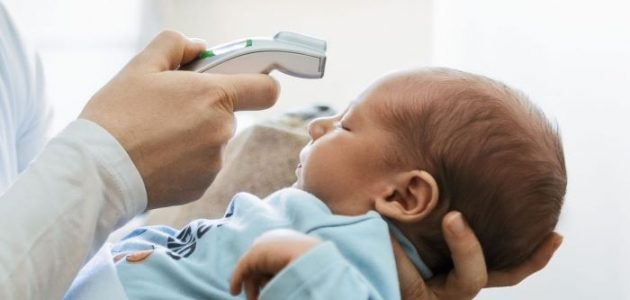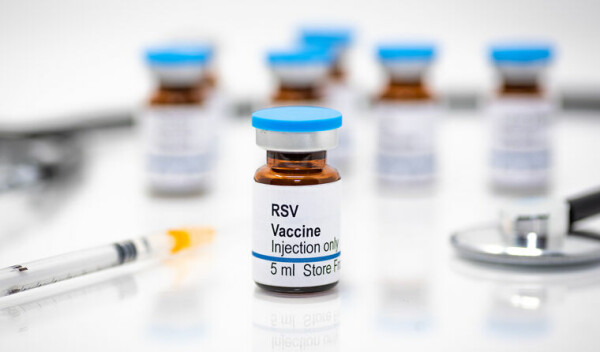
Despite NIAC recommendations, not ALL babies will get RSV immunisation this year
Pharmacist Sheena Mitchell urges the Minister for Health, Stephen Donnelly to take swift action and expand the Respiratory Syncytial Virus (RSV) immunisation programme due to commence on 1st September, to include babies aged 6-months and under as recommended by National Immunisation Advisory Centre (NIAC). The deadline to order the RSV antibody treatment is looming, with other key dates to deliver the programme successfully fast approaching.
The National Immunisation Advisory Committee explicitly state in their recommendation to Government that all babies aged 6-months and under should be immunised to safeguard their health after the last two years of unprecedented numbers of RSV infection in Ireland. The immature immune systems and lungs of infants under 12-months make them the most vulnerable category, with many requiring in-patient hospital medical attention and intensive care treatment.

Motivated by her role as a community pharmacist and her passion to advocate for patient-first healthcare, Sheena Mitchell is urging the Irish government to act now and initiate a catch-up programme to include all babies aged 6-months or under on the 1st September. What is more, in addition to NIAC’s recommendations, a comprehensive study in France of over 180,000 babies over an 8-year period reinforces this approach. It shows that the rate of in-patient hospital treatment for babies under 12-months whether born in RSV season or out of season does not significantly differ.
Pre-empting all potential barriers to the rollout of a catch-up programme to extend RSV immunisation to all babies, Pharmacist Sheena Mitchell outlines the following ‘Roadmap’ for the Minister for Health:
|
|
POTENTIAL BARRIER |
SOLUTION |
|---|---|---|
| Immunisation Training |
Doctors, Nurses and Pharmacists are required to complete an online training module and receive a certificate of competency before delivering any new immunisation or new strain of vaccine.
|
Mobilise RSV immunisation training now. It is online training. If the immunisation administration doctors and nurses in 19 busy maternity hospitals, can find the time, so can GPs and practice nurses, and pharmacists if allowed. Just as they find the time every year to upskill for each year’s new strain of flu and covid vaccine. |
| Distribution |
The HSE vaccine distribution centre delivers all public vaccines for administration within the community using strict temperature controlled protocols called ‘The National Cold Chain’. The RSV immunisation (Nirsevimab) is not a vaccine, it is a monoclonal antibody treatment and is not covered under the remit of the State vaccine distribution centre. It must be stored at refrigerator temperatures (2°C to 8°C). The limitation of the National Cold Chain to manage vaccines only and not all forms of immunisations. This prevents distribution to GP’s and community healthcare settings. |
Amend the remit of the HSE vaccine distribution centre to include all immunisations – both vaccines and newer immunisation treatments such as monoclonal antibodies. Medicine continues to advance, and vaccines are no longer the only way to provide immunisations. Only one RSV antibody treatment is recommended per RSV season. It can be administered alongside other childhood vaccines that are already routinely sent to community health settings within the existing Cold Chain. |
| Legislation |
An amendment is required to the Medicinal Products (Prescription and Control of Supply) Regulations 2003 in order for nurses and pharmacists to administer a new vaccine. A Statutory Instrument (S.I.) can amend legislation to include the monoclonal antibody treatment for RSV. In the same way this legislation was made fit for purpose to include Covid, Flu, Pneumonia and the Shingles vaccines to be administered within the health community without a prescription. |
If the Health Minister cannot amend the legislation in time, before the Dáil rests for the summer, the other option is to include the RSV antibody treatment within the National Childhood Immunisation Schedule for children attending their GP between September and March each year. Vaccines included in the schedule do not require a prescription. Realistically, within the timeframe available, a Statutory Instrument is the only feasible option for this year. There is time if there is political will. |
| Supply |
A supply of 28,000 RSV antibody treatments have been ordered. This will only cover newborns from September to February. Additional stock needs to be ordered now from the pharmaceutical manufacturers if there is to be sufficient supply for a catch-up programme to include babies aged 6-months and under at the start of the RSV season (September) as per the explicit recommendations from NIAC. |
The Minister for Health needs to free up the budget required to order additional RSV antibody immunisations. The monetary cost to the state of RSV medical attention in ICU, Emergency departments and at GP offices will cost significantly more |
RSV GETS LOST IN ACRONYM BUREAUCRACY
The HSPC monitor and report to the HSE on all incidence of notifiable diseases in Ireland including RSV. Their 2023-24 report stated that the last RSV season was the worst in Ireland’s history with 8,991 cases. There were 1,397 RSV hospitalisations in the under one year age group, 118 of these were tiny babies that required intensive care. However, the reality is that there were many more RSV cases that were managed at home without medical intervention due to overcrowding at hospitals and lack of availability for GP appointments.
Following NIAC’s recommendations on RSV immunisation to the Minister of Health and the Department of Health, the CMO ordered HIQA to complete a rapid HTA back in February this year. To date, this cost-benefit analysis report has yet to be delivered, leaving the Minister for Health scrambling to introduce a ‘Pathway’ or interim solution for the coming RSV season. Something, being better than nothing, it seems.

HOW DOES RSV IMMUNISATION WORK?
There is no cure for the highly contagious Respiratory Syncytial Virus (RSV) that can cause severe respiratory tract infection and breathing difficulties in the very young and elderly. More advanced than a vaccine, the RSV monoclonal antibody treatment provides infants with readymade antibodies to fight RSV infection. The immunity lasts around five months, which is about the same length of time as the average RSV season.
NEW RSV ‘PATHWAY’ PROGRAMME
The new RSV Pathway Programme is limited to babies born from the 1st September 2024 to the following February. Following the government announcement last week of the estimated 28,000 RSV immunisations estimated to be administered to newborns this season, Pharmacist Sheena Mitchell’s Wondercare.ie health platform lit up with questions from worried parents. The common thread being anger, upset and distress that their baby won’t qualify for RSV immunisation.
Pharmacist Sheena Mitchell points out, where there is a will there is a way, or in this case she questions whether the government has lost their way due to the pending summer holidays.
The Dublin Pharmacist and Wondercare.ie health podcaster, Sheena Mitchell says:
“We just need some joined up thinking, which I appreciate is hard considering that at least six government departments need to collaborate to rollout an immunisation programme. However, it seems that the civil servant summer holidays are the priority, rather than the potentially deadly winter RSV season.”
“Commonsense prevailed during Covid, when decisions were made in the best interests of the patient. This is the approach we need now rather than letting bureaucracy take over. There is no room for politics in healthcare. I implore the Minister for Health, Stephen Donnelly to step up and demonstrate true leadership by cutting through the red tape now to get things done.”
“Time is running out; we need ACTION now to protect our vulnerable babies this winter. It is proven, beyond doubt, that babies born outside of RSV season are just as at risk of hospitalisation as those born in season. Last year, 43% of all hospitalisations in Ireland in the under 1-year old age group was due to RSV infection. There is zero logic to the Minister’s reckless approach of only vaccinating newborns.”
Speaking directly to the Minister for Health, as the only one who can make things happen at this late stage, the Pharmacist says: “Minister, I urge you to revisit the 8,991 RSV cases swabbed last year and many more thousands that were not formally diagnosed but treated at home. Consider the 1,397 RSV hospitalisations, including 118 tiny babies that required intensive care treatment. Your ‘Pathway’ is NOT good enough, so I have prepared a ‘Roadmap’, with a solution for every obstacle you may face. I am not in a position of power, but I do have a voice in healthcare, and I am the voice of my patients, so I intend to use it until the ‘powers that be’ listen.”
“Your ‘Pathway’ is to prevent up to 453 RSV hospitalisations of newborns. My ‘Roadmap’ is to stand with NIAC and the parents of all the babies this coming RSV season, to prevent 944 additional hospitalisations by extending the RSV immunisation programme to all babies under 12-months during the forthcoming season. The benefit extends far beyond preventing illness, children’s hospitals would be less overwhelmed, GPs surgeries freed up and paediatric elective surgeries able to take place with ICU beds available. We have a chance to protect all babies this winter if we act now.”
INTERNATIONAL RSV IMMUNISATION PROGRAMMES:
Queensland, New Zealand: This September, newborn Queensland babies will receive RSV antibodies at birth before they are discharged from hospital. All babies can access the RSV immunisation up until they are 8-months old. Babies with complex medical conditions will be able to access their dose up until they are 19-months old.
Caledonia, Spain: Research Study published 10th June 2024 from 2023 data. RSV immunisation given with the same parameters that our own National Immunisation Advisory Committee (NIAC) have recommended: (1) babies born from April to September, and (2) babies born in RSV season from 1st September.
Results:
- 87.6% reduction in hospital admissions due to RSV
- 90% decrease in intensive care unit admissions due to RSV
- 55% reduction in emergency department visits due to RSV
- 68.9% reduction in RSV infections in the community
- 60.7% decrease in the number of viral pneumonia cases (RSV is responsible for 25 % of all childhood pneumonia cases worldwide)
Galicia, Spain: RSV immunisation is now included in the National Immunisation Schedule. All babies under six months at the start of RSV season, and all in season babies are immunised. Result: 89% reduction in infant RSV hospitalisation in the 2023-24 season.
Valencia, Murcia and Valladolid, Spain: RSV immunisation was given to all infants aged 9-months or under at the start of RSV season 2023. Result: 84.4% reduction in infant RSV hospitalisation.
Tune into the WonderCare.ie Podcast for more RSV information episodes, including the Roadmap for Minister Donnelly and expert medical advice on how to safeguard family health. Find a WonderCare Podcast on iTunes, Spotify or wherever you stream your podcasts.
Sheena Mitchell is a mum of three children who provides expert pharmacist advice through her community pharmacy – Milltown totalhealth Pharmacy in Dublin, online healthcare platform WonderCare.ie, podcast and social media channels. @WonderCare_Irl
